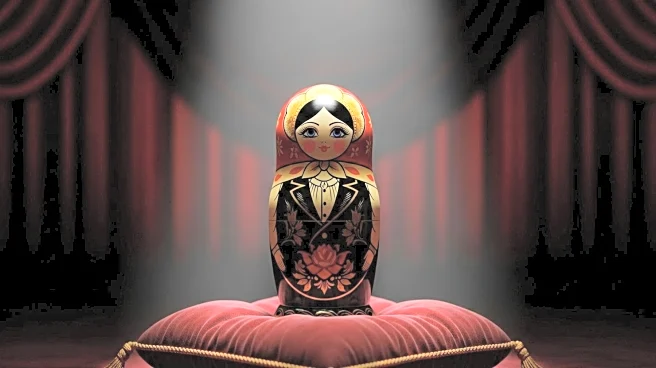What's Happening?
Jude Law stars as Vladimir Putin in 'The Wizard of the Kremlin,' a political thriller that premiered at the Venice Film Festival. The film, directed by Olivier Assayas, received a 10-minute standing ovation, highlighting Law's compelling performance. Set during the final years of the Soviet Union, the story follows Vadim Baranov, played by Paul Dano, as he becomes Putin's spin doctor. The film, adapted from Giuliano da Empoli's novel, explores the complexities of modern politics and the influence of media. Alicia Vikander also stars as Baranov's romantic interest, adding depth to the narrative.
Why It's Important?
The film's portrayal of Vladimir Putin and the political dynamics of the early 1990s offers a timely reflection on current geopolitical tensions, particularly in light of Russia's ongoing actions in Ukraine. By dramatizing the rise of Putin, the film provides insight into the mechanisms of power and media manipulation, themes that resonate with contemporary global politics. Jude Law's performance and the film's reception at Venice underscore its potential impact in shaping public discourse around these issues.
What's Next?
Following its successful premiere, 'The Wizard of the Kremlin' is likely to attract further attention at international film festivals and potentially secure wider distribution. The film's exploration of political themes may also prompt discussions among audiences and critics, contributing to a deeper understanding of the historical and current political landscape. As geopolitical tensions continue, the film's narrative may serve as a catalyst for dialogue on the role of media and leadership in shaping public perception.
Beyond the Headlines
The film raises ethical questions about the portrayal of real-life political figures and the balance between fiction and reality in storytelling. It challenges viewers to consider the impact of dramatization on public understanding of historical events and the responsibilities of filmmakers in representing complex political narratives. Additionally, the film's focus on media influence highlights the power of storytelling in shaping political discourse and public opinion.









